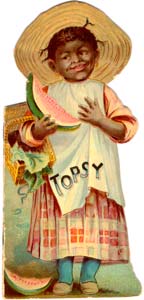The material on slavery is fairly extensive, most takes the abolitionist stance but few opportunities are missed to add a racist caveat or two, lazy and stupid being the favorites. The African in Men and Manners, in Verse (1.5.9) is typical:
Where delicious fruit and gold,
Are alone at his command,
Where the ivory is sold,
is the Negro's native land.
And though black his hue may be,
And though indolent his soul,
There he roves in liberty,
Far from tyrant white's control.
An Amusing Trial In Which A Yankee Lawyer Rendered A Just Verdict (1.5.11), 1841, has a protagonist with the imagination to see himself in his slave's shoes:
A Yankee lawyer long had kept
A negro-man with whom he slept.
. . . And thus he said, why should not I
Be slave instead of Cuff, and he
As well be running after me
As I for him? I'll let him go,
Whether he's free by law or no.
There is racist caricature aplenty. "B stands for Boatmen, who work hard for the money" in Dinah's ABC (3.1.12).
J stands for Jim, the funny Jim Crow.
N stands for Niggers, well able to row.
Topsy (4.7.1) is die-cut in the shape of a little black girl eating watermelon. Friday is depicted as a minstrel with a banjo and a bowtie in one Robinson Crusoe (4.7.3). Papa Poodle in The Blue Bells on the Lea (14.2.1) reads a book upside down.
Those woolly locks of yours
grow thicker and thicker, Papa Poodle,
Does the wool tangle inside
as well as outside your head,
and is it that which makes you such a noodle?
The titles of Lazy Little Jerusalem (2.1.6), and ads for "Cut-Up Niggers, Six Kinds" and The Funny Little Darkies and the Camptown Races give an idea of their contents.
 A patronizing attitude goes along with protecting "the harmless black-a-moor" in Inky Boys (4.2.4) in which St. Nick dips white boys in an inkpot for causing mischief. Blanche and Cora or Love and Duty (13.3.3) is an overwrought fantasy in which a slave girl is befriended by an English family who move to Florida. She speaks like Tonto in "The Lone Ranger": "Me look like English missie now; don't me, Mother?" She saves the sleeping daughter by shooting a snake with a bow and arrow. Her feat is meant to convince readers that even slaves have their good qualities.
A patronizing attitude goes along with protecting "the harmless black-a-moor" in Inky Boys (4.2.4) in which St. Nick dips white boys in an inkpot for causing mischief. Blanche and Cora or Love and Duty (13.3.3) is an overwrought fantasy in which a slave girl is befriended by an English family who move to Florida. She speaks like Tonto in "The Lone Ranger": "Me look like English missie now; don't me, Mother?" She saves the sleeping daughter by shooting a snake with a bow and arrow. Her feat is meant to convince readers that even slaves have their good qualities.

